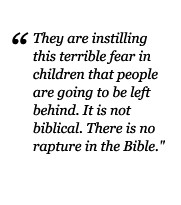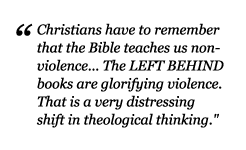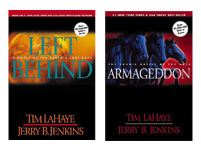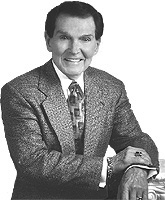OldSpeak
God So Loved the World that He Gave Us World War III: An Interview with Barbara Rossing
By John W. Whitehead
July 01, 2004
In her most recent book, The Rapture Exposed: The Message of Hope in the Book of Revelation (Westview Press, 2004), Barbara R. Rossing, an associate professor at the Lutheran School of Theology at Chicago, challenges the violent interpretation of the book of Revelation as it is presented in Tim LaHaye’s widely popular Left Behind series, and all it presumes to communicate about the future of the world, by offering a positive interpretation of Revelation in which the world is not "left behind."
"I was on 60 Minutes with Tim LaHaye," Rossing tells John Whitehead in this exclusive OldSpeak interview. "He said that liberals have created this loving, wimpy Jesus and that we need the judgmental, warrior Jesus. The big question now is what is the true image of Jesus? A loving Jesus is not wimpy. A loving Jesus is precisely who Jesus is, and that is how he is portrayed in the Gospels."
The real goal of the book of Revelation, Rossing tells Whitehead, "is to comfort and inspire Christians to a vision of hope. In the early Roman Empire, when it looked like violence was getting out of hand—much like things today—it was a message to people that the empire would not last much longer and that the Emperor was not the one in charge of the world. Jesus is in our midst, but He is not the avenging warrior Jesus. Jesus is the lamb who is leading us to a different way of life—one espousing love."
Rossing refuses to mix words in her condemnation of the so-called "rapture," which she believes is simply playing upon people’s fears. "They (the Left Behind series) are instilling this terrible fear in children that people are going to be left behind. It is not biblical. There is no rapture in the Bible."
"Many people take the Left Behind mentality very seriously," says Whitehead. "Isn’t this thinking dangerous for the future of the human race and the planet earth? It is extremely dangerous and perhaps even more so because it is a fictional story. And people can’t tell where the fiction ends and reality begins."
"Yes," Rossing answers without hesitating. "It is very dangerous for the future of the human race."
 |
| Barbara Rossing |
Before joining the seminary's faculty in 1994, Rossing served a congregation in Minnesota, was assistant and acting director for Global Mission Interpretation for the American Lutheran Church, pastor at Holden Village Retreat Center, Chelan, Wash., and chaplain at Harvard University Divinity School.
Ordained in 1982, Rossing has lectured and preached widely in the Evangelical Lutheran Church in America (ELCA), including keynote lectures at Women of the ELCA theological conferences, global mission events, and synod assemblies. Rossing received the Bachelor of Arts degree from Carleton College, Northfield, Minn., the master of divinity degree from Yale University Divinity School and the doctor of theology degree from Harvard University.
JWW: The first sentence in the first chapter of your book is, "The rapture is a racket." Why do you say that?
Barbara Rossing: My emphasis is not on the financial racket side of things, which I don’t know much about. Some argue that the whole prophecy industry is hucksterism, but I am referring to the theological racket. It is also a political racket, I think. They are playing off of people’s fears.
JWW: Are you talking about Tim LaHaye and Jerry Jenkins?
BR: Yes, these people and their books, among others. It is the whole idea of the rapture, which plays on people’s fears. They are instilling this terrible fear in children that people are going to be left behind. It is not biblical. There is no rapture in the Bible.
JWW: You write in your book that the rapture idea is only 170 years old. Most people don’t realize this. They probably believe this is what the Apostle Paul preached. Supposedly in Scotland in 1830, a 15-year-old girl named Margaret MacDonald had a vision about the rapture. It was later amplified by a man named John Nelson Darby. Darby spread the rapture idea. Can you expand on this?
BR: I don’t know how seriously to take the Margaret MacDonald story.
JWW: Are you saying that Darby was not telling the truth?
BR: I think Darby genuinely believed what he was saying about the rapture. But he did invent the notion of the two-stage return of Christ; that is, a rapture of believers and then a return as a sort of warrior king. The Apostle Paul never taught this. No other biblical figure did, either. Prior to Darby, there was no one teaching a line between the so-called rapture and the so-called 7-year period of tribulation, with a second coming of Christ. This was all new, and it began in the 1830s.
JWW: The rapture is only 170 years old? Thus, you are saying that the rapture, the Left Behind books and the Hal Lindsey books are something the traditional churches didn’t believe until 1830.
BR: Right. The traditional church certainly believed in Jesus’ second coming and in the resurrection. However, they did not believe in a two-stage second coming.
JWW: What about the rapture?
BR: That was a new word. The traditional church has always believed in Christians going to heaven. However, not for just seven years. The entire concept of the rapture as constructed by Darby was not believed by the traditional church.
JWW: Where did Darby get the idea?
BR: That I don’t know.
JWW: In your book, you argue that the whole dispensational system is a fabrication of Darby.
BR: Yes.
JWW: Was Darby, in your opinion, a hunter? Did he believe the rapture idea? Was Darby reliable? Or was he mentally imbalanced?
BR: That I don’t know, either. He was the founder of the Plymouth Brethren, and he certainly took his missionary work very seriously. But he wasn’t reliable in his biblical interpretation. He was simply wrong.
JWW: You mention the impact of the Scofield Bible. How did it help promote the rapture idea?
BR: The Scofield Bible, which is a version of the King James Bible, sold millions of copies in the 1900s in this country. It is accompanied with notes and interpretations by Cyrus Scofield, who based many of them on rapture theology. Thus, his notes on the prophet Ezekiel, for example, and his notes on the book of Revelation use the framework of Darby’s dispensationalist rapture viewpoint to make comments on biblical passages. However, the thing is an annotated Bible and appears to be very authoritative. It looks like that is what the biblical passages are saying, but in actuality it is what Scofield is saying, not the Bible.
JWW: Are you saying that Scofield’s theory was believed as if it were literal Scripture?
BR: Yes. And we all use the annotated Bible. I order them for my students and recommend them. However, I would not recommend the Scofield Bible. I would use the Oxford Annotated Bible or the Harper Collins Bible. Annotations per se aren’t bad, but we need to remember that annotations are not the authoritative words. They are just the commentators’ interpretations.
JWW: But the Scofield Bible is very popular. Your argument is that it has sold the rapture idea, which you believe is a fraud, to mainstream America?
BR: Yes, I am saying that. The Scofield Reference Bible, more than anything else, sold the idea of the rapture to mainstream America.
JWW: A misinterpretation of theology was basically sold to the point today where it has become basically fact in most churches?
BR: Well, hopefully not for most churches.
JWW: Most fundamentalist churches teach it, don’t they?
BR: Yes, most fundamentalist churches teach it. However, the rapture theology has never been the traditional teaching for Roman Catholics, Lutherans, Episcopalians, Presbyterians or Methodists. But you are right. The fundamentalist churches teach it.
 |
 |
JWW: The rapture idea had to come from somewhere. What are the key Bible verses that supposedly prove the rapture?
BR: It mainly comes from references in the Bible to the resurrection of the dead. That is found in Corinthians where St. Paul is talking about how Jesus was raised from the dead as the first proof and that we all will be raised or resurrected. But resurrection is not the same as rapture. People such as LaHaye and Lindsey try to make it the same, but it is not. Resurrection of the dead is the traditional Christian teaching.
JWW: But there must be other verses?
BR: There’s also Thessalonians 4:17, where the Apostle Paul is writing about resurrection. He starts out this little section stating that since Jesus died and rose again, God will bring with him those who have died. Thus, the context of these passages is resurrection.
JWW: Not the so-called rapture.
BR: No. The people in Thessalonica were worried because some of their relatives had died before Jesus’ second coming. They wanted to make sure that they wouldn’t be separated from their relatives. So Paul wrote that when Jesus returned to earth, the dead in Christ will rise. This is the passage: "We who are alive who are left will be caught up in the clouds together with them to meet the Lord in the air." That is why Christ is returning to earth. This is Jesus’ second coming. The emphasis is that all of us participate in going to greet Jesus. But it’s not a rapture or a snatching of people up to heaven for seven years.
JWW: The word "rapture" is not even in the Bible, is it?
BR: No. It is not in the Bible.
JWW: Where are they getting the idea? Where does the word rapture come from?
BR: They get it in this verse.
JWW: Although the word rapture is not used there?
BR: It’s the word rapturo from the Latin Bible. They say that is where they get rapture from, but it definitely is not in the Bible.
 |
 |
JWW: Let’s talk a moment about the Left Behind novels. The fact is that we live in a very violent world. Do you believe the Left Behind novels are simply reflecting what is going on in the world today? You do not believe them to be biblical. But are they portraying something close to reality? Do you see what I am saying?
BR: I do, but I think they are creating reality as well. They are making people think that this is what reality is, that somehow it is God’s will to have violence in the world and that the world has to get worse and worse so that Jesus can fight the battle of Armageddon. Then Jesus can return.
JWW: Are you saying that they glorify violence, war and mayhem?
BR: Yes.
JWW: You argue in your book that God still loves the world and doesn’t want to destroy the earth. But we see violence all over the world. We live in a very violent world. How do we explain all that? Maybe the Left Behind novels are trying to explain it.
BR: Jesus also lived in a violent world—a world as violent as the one we live in. The Roman Empire was extremely violent, but Jesus didn’t respond in kind. That is the key. Christians have to remember that the Bible teaches us nonviolence in the face of violence. But what’s different is that Christians through such things as the Left Behind books are glorifying violence. That is a very distressing shift in theological thinking.
JWW: Is it the mentality that I have often heard from numerous Christian leaders who have a vested interest in the rapture that "you don’t polish the brass on a sinking ship"?
BR: Dwight Moody said that.
JWW: That mentality obviously leads to other things. For example, you quote Ann Coulter who has said, "God gave us the earth. We have dominion over the plants, the animals, the trees. God said, ‘Earth is yours. Take it. Rape it. It’s yours.’" Are you saying the Left Behind books and that sort of theological thinking leads to a rape of the world because there is no reason to look toward a better tomorrow?
BR: Yes, exactly. I am not necessarily saying they do that. However, that kind of thinking leads to that. For instance, in the Left Behind novels, the characters start buying bigger and bigger cars. They first buy a Range Rover, and then they buy a Hummer. But they don’t buy it. They just get it. There is a sense that they can use up the earth.
JWW: Because there is no reason to conserve.
BR: Right. I disagree with the idea that the world is a sinking ship. God created the earth. And even though there is sin in the world, God does not give up on this world. Thus, we can’t view it as a sinking ship.
JWW: Quoting from your book, you write, "If we want to find God today, we must stoop low—to look into the manger into which Jesus was born, to find God in the small things, in the daily stuff of earth. God is not found in the violent Red Horse of the apocalypse but incarnate in the holiness of everyday life." Doesn’t the "us versus them" mentality of the Left Behind novels go against your theological position?
BR: Yes.
JWW: On much Christian television such as the Trinity Broadcasting Network or the Christian Broadcasting Network, the idea of the rapture and a violent apocalypse are overwhelmingly taught to millions of unsuspecting Christians. How can people who are really concerned about these books and this idea counter it?
BR: We counter it with lamb power. Jesus is the lamb in the book of Revelation who teaches a different way than more and more firepower and violence. It’s the power of love to change the world. This philosophy will not make it as an exciting book or movie.
JWW: You write that the Left Behind books teach what you call a "theology of despair." I am sure that Jenkins and LaHaye would say, "Wait a minute. This is positive." If you believe in Jesus, you are going to get raptured out of the world before all the violence happens. They are not going to say it’s despair.
BR: To the contrary, it is teaching despair for the earth. It’s the sinking ship mentality. It’s viewing the earth as a sinking ship. Why polish the brass on it? It is exactly that. So it’s the theology for the earth. And although the likes of LaHaye and others tell individuals that they can be saved out of the world, the world cannot be saved.
JWW: There is a strain of violence in the Left Behind novels by Christians, who carry weapons and fight the anti-Christ’s army. Let’s just say it’s true that the anti-Christ is coming. How do Christians respond in that situation? Do they pick up a gun and shoot back to defend themselves? How do Christians act in a situation like that?
BR: Jesus in the Garden of Gethsemane told Peter to put away his sword. Christ said that those who take up the sword will perish by the sword. There is absolutely no invitation in the New Testament for Christians to take up violence as a way of responding to evil in the world.
JWW: If Christians are not supposed to gear up and become armed to fight the anti-Christ, how should they live in the so-called end times?
BR: Just like the early Christians did, with love, joy, an infectious kind of hospitality and a lamb power that has the power to persuade people by our love toward them.
JWW: You write in your book that early Christians definitely thought they were living on the brink of the end times. Even Jesus taught that. It seems that the Apostle Paul in First Thessalonians thought he would probably be alive when Christ returned. Do you think there is a possibility that the early Christians were preparing to fight the anti-Christ?
BR: Not with violence like in the Left Behind novels. Instead, they were preparing to fight with a courage and with a willingness to be martyrs, but not with weapons. They never did. There is no record of any early Christians doing such things.
JWW: Jesus was a leader of an apocalyptic religious sect that expected the end to come soon. He was apolitical. Apocalypticism seems to make politics irrelevant. However, many Christian fundamentalists are heavily involved in politics armed with the rapture mentality. How do you think that squares up with the New Testament of Christianity?
BR: It doesn’t.
JWW: You write that God saves us by not snatching us out of the world but by coming into the world to be with us. What do you mean by that?
BR: Jesus was born into the world as a child of a poor family, and surely since then God has never left the world behind. We should think and act just as Jesus did. He wasn’t a political activist in any sense, but he certainly challenged oppression. Christians are still to be engaged in bringing about God’s healing through love and nonviolence.
JWW: You use the word healing. However, the whole idea of the Left Behind books seems to say just the opposite. They create division. It’s an "us versus them" mentality.
BR: That’s right.
JWW: Do you think that the long-term effect of this kind of thinking could basically destroy what many people call the Christian witness of Christ’s love? Christ seemed to bring people together. Could the end result of the Left Behind mentality separate people and drive them away from Christ’s healing power?
BR: I was on 60 Minutes with Tim LaHaye. He said that liberals have created this loving, wimpy Jesus and that we need the judgmental, warrior Jesus. The big question now is what is the true image of Jesus? A loving Jesus is not wimpy. A loving Jesus is precisely who Jesus is, and that is how he is portrayed in the Gospels.
JWW: In the Left Behind books, there are frequent references to World War III, the battle of Armageddon and millions of people being slaughtered. Do you believe the Left Behind books are attempting to push us toward World War III? Do you think that is what LaHaye and others want? Is that a goal of their books?
BR: I hope not.
JWW: What do you believe?
BR: I think they are glorifying war, but I certainly hope they are not trying to precipitate it. But I don’t know. I don’t know their motive. I really have no idea.
JWW: You quote Pastor John Hagge in your book as saying, "World War III is more than a bit player in a Dispensationalism strip. Its onset is supposed to be cause for rejoicing among true Christians. We are seeing in my judgment the birth pangs that will be called in the future the beginnings of the end. I believe in my mind the Third World War has already begun. I believe it began on 9/11."
BR: I don’t know what to think about these kinds of statements. However, I will say that recently on the Left Behind web page there was a disturbing article. It posed questions such as: "Will American troops be at Armageddon?" and "Could the anti-Christ come from the U.S.?" And so on. On the Left Behind website, LaHaye comes close to glorifying war and maybe even specific wars.
JWW: Tim LaHaye has a long history, as you note in your book, of very intense involvement in right-wing political causes. You write that with the Left Behind novels, LaHaye has created a powerful platform for influencing mainstream America through the fictional characters’ perspective on a whole range of conservative political issues, including anti-abortion, anti-homosexuality, anti-environmentalism, militarism and Middle East policies, as well as opposition to the United Nations. What it seems here is that there is a mixture of political and social causes all wrapped up in a rapture burrito for people to consume. Many people take the Left Behind mentality very seriously. Isn’t this thinking dangerous for the future of the human race and the planet earth? It is extremely dangerous and perhaps even more so because it is a fictional story. And people can’t tell where the fiction ends and reality begins.
BR: Yes, it is very dangerous for the future of the human race.
JWW: I would venture to say that a lot of people reading the Left Behind books don’t see them as fiction.
BR: That is the danger.
JWW: It’s different than reading a Stephen King book, which you know is fiction. I agree with you. I, too, think that a lot of people who read the LaHaye books believe they are true. This is reflected in a Chronicle of Higher Education article that you cite in your book. In a recent poll, it states that 40 percent of Americans are influenced by the LaHaye-type mentality, the rapture and the apocalypse. This, of course, brings me to President George W. Bush, our so-called Christian president. Bush has indicated that his theological beliefs helped drive the U.S. foreign policy of Iraq. Do you think the Left Behind books are a roadmap for the direction the United States is taking in the Middle East?
BR: I sincerely hope not. But there was a recent article in The Village Voice that discussed a meeting President Bush and Elliot Abrams had with fundamentalist Christians about some of this. I hope it is not influencing President Bush’s policy, but that article suggests it is.
JWW: You discuss Christian Zionism in your book. You seem bothered by it. Why?
BR: I am a supporter of Israel and a Zionist in the traditional sense. However, the militant Christian Zionism of authors like LaHaye argue that all the land that ever was biblical Israel needs to be given to the state of Israel. In the most extreme scenario, Palestine cities need to be relocated and virtually everything has to be relocated so that the Jewish temple can be rebuilt. This is ridiculous.
JWW: Why is it ridiculous?
BR: First, this is not biblical. Second, the Palestinian Christians—the whole Palestinian people—are also God’s people. They too are created in the image of God, and they are our sisters and brothers. They also have a right to that land.
JWW: There is a quote from your book: "Palestinian Christians do not even exist in the eyes of the dispensationalists (that is, modern evangelicals)."
BR: I am not speaking of modern evangelicals. There are definitely moderate evangelicals who do not embrace Christian Zionism and who want a more even-handed approach. What I am critiquing is the extremist position of the Left Behind authors and their views on Middle East policies.
JWW: In the current U.S. Middle East policy, there is an infusion of religion, especially with George Bush. Do you think there is the possibility of such doctrines as the rapture driving foreign policy? This has some Americans concerned.
BR: It should concern them. We can’t allow our foreign policy to be driven by a particular interpretation of the Bible that sees the world as ending in extreme violence.
JWW: Is it your concern the idea of a violent, apocalyptic ending? If U.S. foreign policy were driven by love your neighbor, would we have a different outcome?
BR: Yes, if it were driven by love your neighbor. In Bob Woodward’s book, he asked George W. Bush before the Iraqi war if he would consult with his father, George H.W. Bush. The President said that he had another father he consults with, God, in other words. I believe he needs to consult with his earthly father about Middle East policy for the simple reason that the first George Bush had a more even-handed and responsible Middle East policy than this one does. This is what we really need to see now.
JWW: The evangelicals have some influence on George Bush, how much one does not know. However, the idea that Bush seems to portray—that is, the aggressive us versus them foreign policy fused with a religious mission—seems to be influenced by the LaHaye-type philosophy. Add to that the fact that we are at a point in this country where at any second the wrong person in power can determine who lives and who dies in another part of the world and it might be based on the rapture idea.
BR: Yes, that would be terrible.
JWW: I hope this doesn’t sound extreme. Doesn’t a lot of this end-times thinking sound like a death cult?
BR: I don’t know that, but apocalypticism has always had this dangerous side to it. That is why the book of Revelation almost didn’t make it in the Bible. Even the early Christians knew there was a risk with apocalyptic literature.
JWW: And the risk is what?
BR: The risk is this kind of us versus them mentality. It is a dualism. A dualistic view of the world sees everything as black and white and sees that we are to do battle against the forces of evil.
JWW: What is the real goal of the book of Revelation?
BR: It is to comfort and inspire Christians to a vision of hope. In the early Roman Empire, when it looked violence was getting out of hand—much like things today—it was a message to people that the empire would not last much longer and that the Emperor was not the one in charge of the world. Jesus is in our midst, but He is not the avenging warrior Jesus. Jesus is the lamb who is leading us to a different way of life—one espousing love.
JWW: What does the word apocalypse mean?
BR: It means unveiling or pulling back a curtain.
JWW: How did it come to be associated with mass killing in an apocalyptic war?
BR: Because some of the apocalyptic literature has references like that.
JWW: But apocalypse simply means that God is unveiling some truth to us and it is a message of hope.
BR: In Revelation also the truth was unveiled about the evil Roman Empire. That’s what the apocalypse was unveiling. It was an unveiling of the bankruptcy of the Roman Empire and the true power of hope and of Jesus Christ.
JWW: You write, "God cannot be imprisoned in a pre-determined script. This is perhaps the most dangerous aspect of the dispensationalist view of prophecy." What do you mean by that?
BR: Prophecy is prediction of events in advance. But some of the Left Behind writers distort it. For example, they have this whole thing on the Left Behind web page that pictures America in the end times. America isn’t mentioned in Bible prophecy. Why is that? It was because America wasn’t even in existence when the Bible was written. There was no America 2000 years ago when Bible prophecy was written, and prophecy is written about its own time. It was a message of prophecy for the people for whom it was written. But the Left Behind writers think that because prophecy predicts everything in advance, it’s America that is in prophecy.
 |
| Left Behind author Tim LaHaye |
JWW: You argue in your book that LaHaye, Jenkins, Lindsey and others are addicted to war.
BR: Yes, I see that clearly in their books and what they say.
JWW: Why do you think they are addicted to war?
BR: Violence is addictive. Any of us could get addicted to it. Look at video games. They’re thrilling and exciting. They’re fast paced. It could happen to any of us. War correspondent Chris Hedges clearly shows us that in his book, War Is The Force That Gives Us Meaning. He says that violence is the most powerful narcotic ever invented. Yes, all of us can be sucked in by violence. That is why we need to resist. As a lamb, Jesus teaches us how to resist this sucking power. Violence was attractive even to early Christians, who were told not to go to the gladiator spectacles because they were going to find them fascinating and thrilling. Christians aren’t supposed to go to violence for entertainment.
JWW: You quote the former Israeli intelligence agent and director of the American Jewish Committee. On 60 Minutes, in speaking of the Christian Zionists, he said, "God save us from these people." Why do you think he said that?
BR: I believe most peace-loving Israelis are horrified at this kind of extremist Christian theology—even though some of them have decided to accept the much-needed financial support. However, several weeks ago, two former Chief Rabbis of Israel came out against accepting money from American fundamentalists. That was a break.
JWW: In your book, you state that it’s not because the evangelicals love Israel that they support the Jews. It is because they think Israel is going to lead to what they want in terms of the apocalypse.
BR: Yes.
JWW: Are the evangelicals pro-Israel in the true sense of the word then?
BR: They are pro-Israel in the immediate short term. However, in the ultimate, if Israelis don’t defer to Christianity, these fundamentalists will treat them all as being killed.
JWW: Martin Luther once said: "If I knew the world was going to end tomorrow, I would plant a tree." What do you think Martin Luther is trying to tell us with this statement? In your opinion, why is there a better script to follow than the Left Behind novels?
BR: I believe Luther is trying to tell us that God wants us to live caring for the world until the very last moment. Thus, if I know the world is going to end, then I need to be obedient to Jesus’ parables where he tells us to care for one another.
JWW: To be a Good Samaritan.
BR: Yes. And the parables about the people who are left in charge of the household while the master is away who cannot start beating the fellow servants or abuse them. We have to take care of them for when the master returns. So I believe that if we know Jesus is going to return and it could happen at any moment, then we need to be more ardent and urgent in caring for one another and our world. Planting a tree is a great way to do that. The basic message is love for all of life and our fellow human beings.
DISCLAIMER: THE VIEWS AND OPINIONS EXPRESSED IN OLDSPEAK ARE NOT NECESSARILY THOSE OF THE RUTHERFORD INSTITUTE.


